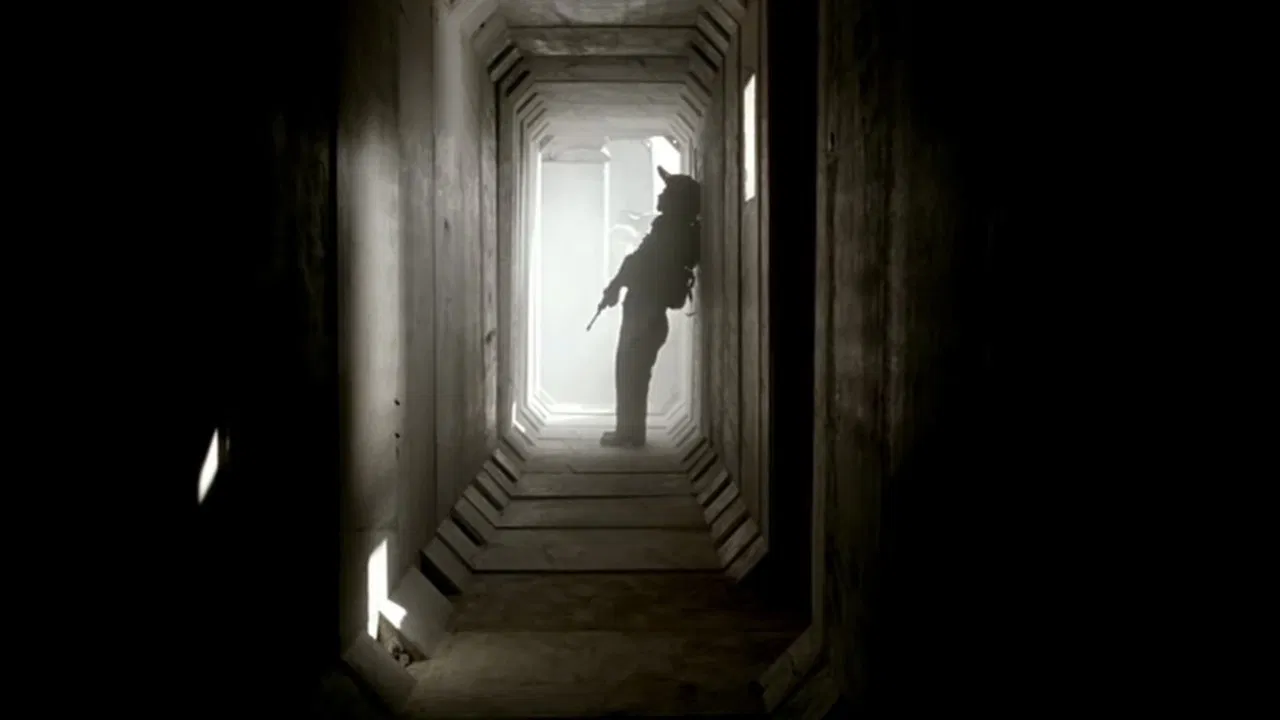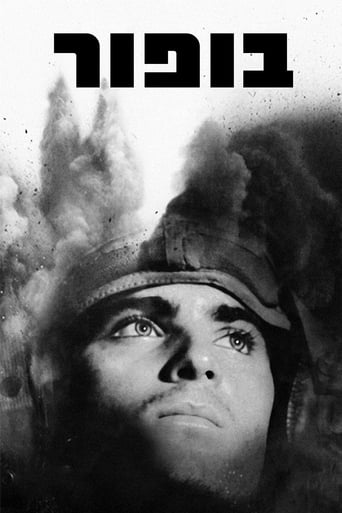

'A more mature version of Buffalo Soldiers' would be the easy, one sentence summary for 2007 Isreali film Beaufort; a film looking at the smaller, less exciting situations and scenarios behind the larger, more significant situations and scenarios that shape certain people's lives. The film is slow, but deliberately so, pointing out the insanities of war by having the primary soldier characters sit around and eventually loose interest at the sound of shelling and warning of incoming explosive shells; thus leading to a potentially damaging mental attitude when something dangerous isn't initially treated as such. If people are to find the film slow, then the film has done its job because it avoids following a nice, neatly plotted route that instigates familiarity and a sense of accomplishment. What the characters do is a slow process, and Beaufort studies it.Joseph Cedar's film sees a number of Isreali troops inhabit a reasonably large bunker in southern Lebanon at Beaufort Castle stronghold. The year is 2000, and the troops are a part of Isreal's army holding the area from Lebanon forces located several miles away and mostly limited to the odd rocket or shell landing on or around the area of the stronghold. The film builds to the historic IDF withdrawal, in which the Isreali troops abandoned the fort and the conflict fizzled out with a political handover. Cedar uses the time leading up to this event as a chance to deconstruct the troops; to have them indulge in any necessary acts of questioning one's role in life and in the conflict as well as document what it took for the men involved to get by; to live; to survive and, ultimately, to get by the monotony.No, don't worry – there are no tank drivers ploughing into other vehicles whilst under the influence of drugs in this film like there are in Buffalo Soldiers. Rather than take guidance from a Cheech and Chong movie, Beaufort draws on 1981's 'Das Boot' for inspiration, at least according to Cedar himself. The inspired ideas are clear: a study of what happens in-between conflict with the enemy and how conflict with friends as well as foes can lead to everyone's downfall. Beaufort's approach to the material, that could so easily have been delivered hollowly and without much intrigue, isn't an airy and sweeping approach that relies on long, long takes of external shots of the fort. Instead, it is constructed in an uncanny sense; that this space we are inhabiting should be something to be feared, and that while conflict is sparse with gunfire and man-on-man conflict almost non-existent - that doesn't mean we are not in a war-zone of some kind in the first place.Beaufort carries a low and pulsating noise on its musical track almost entirely throughout. It's a very obvious noise, obvious more at certain times than others, creating an eerie and uneasy sense for a lot of the close, claustrophobic shots of inside the bunker itself. This early series of exchanges, which is meant to get across the bunker as a place of fear, is actually told through the eyes of a certain soldier named Ziv (Knoller), a bomb expert specifically called in to look at a suspicious object not too far away. Since it is our first taste of the bunker at Beaufort, we get to see the dwelling through the eyes of this new recruit as fear and uncertainty washes over us as it does with Ziv. There is no doubt Cedar applies this tactic and removes Ziv from the text at the point he feels we are embedded within the locale and no longer need a rookie's viewpoint to break us in.Some of the more uncanny items that crop up during this opening segment might include Ziv's encounter with a dummy dressed as an Isreali soldier; the manner in which the approach is constructed with the positioning of the doll and the finding out of what it is with the sudden appearance of a friendly soldier, with the rest of the film playing out under grey skies or the black of night, is unexpectedly unsettling and works really well. But this is all introduction, and the bulk of the film will revolve around several other Isreali soldiers, Koris (Tiran); Shpitzer (Perzev) and Liraz (Cohen) to name but a few. Beaufort sees fit to plunge us head first into explosive combat as many of the guys try to avoid incoming artillery shells although later on, the direct hitting of the base, drolly announced by a tannoy with the words 'impact, impact', doesn't seem to have an affect on anyone anymore.Following the continuous so-called monotony of the shells hitting the area, there is one such incidence during which a missile of some description hits the base and everybody suddenly takes notice.The impact is a lot larger and a lot louder than the usual shells, causing panic; causing a sense of urgency. What follows is further use of sound effects as a means of the uncanny what with a bizarre diegetic/non-diegetic siren sound effect clogging up the sound tracks and disorientating the audience just as much as the characters. Beaufort is a film that documents the absurdities of war but through a relatively peaceful and mundane setting and one of its more seductive accomplishments is how it delivers a tale about essentially bored people, in a manner in which we actually find them interesting. Credit where credit's due, Beaufort works.
... View MoreI think that rating films out of 10 is a little futile, as what may stir one person may leave another cold. With that disclaimer set then let me say this about Beaufort: Yes this is a war film, in the sense that the characters are soldiers. It is however, in my opinion far more of a character study than most films in the genre. Full Metal Jacket has been mentioned as a comparable work, and I can understand the comparisons. The internal turmoil of the characters is portrayed with similar verve, and the swings at provoking the big questions have similar merit. Where Kubrick's film veers into the slightly surreal to deliver it's message, Beaufort stairs straight ahead into the stark reality of it's particular war time situation, and this is perhaps the fork in the road where the two films part company. This very tangible starkness is what enables the film to deliver such a telling experience, life and death laid bare for all to see and attempt to comprehend. It is one of the quintessential artistic topics, and Beaufort approaches it admirably. The viewing experience may not be as exhilarating as Saving Private Ryan or Platoon, and it certainly lacks the surrealistic glee of Full Metal Jacket, but Beaufort had me contemplating it's content long after I watched it. It had me writing this review, something that I have not done for any of the films I mention in reference to Beaufort, despite their qualities. In conclusion I would thoroughly recommend Beaufort to anyone that enjoys cerebral films, and if you particularly enjoy war films then I would also recommend Clint Eastwood's "Letters from Iwo Jima" as another excellent war film that is similarly thought provoking.
... View MoreWatching this movie I became slowly engrossed into the claustrophobic world it describes. At the end, I got a feeling that comes only very infrequently when watching movies, which is "Wow what an easy life I am living compared to these guys!". In this movie, death comes without warning, without background music, without philosophical introductions as to the nature of war,of mankind, or of good and evil. You hear the missiles coming in, but you never know which one will find its mark. There is no explicit message, that I could make out (but then I am not familiar with the political background). You can watch it as an anti-war movie, just as you can say it emphasizes the sacrifices of the Israeli soldiers. Anyway, the main point is beyond that, it is the reactions of human beings put under extreme stress. I saw this movie almost by accident and I was afraid it would be documentary and boring, but I really found it one of the best movies I have seen in a while.
... View MoreBeaufort is a remarkable war movie, with a cinematic style that really says something about the war and the situation in which the troops are in. the story is told through the eyes of the main character, Liraz, who's awareness of himself and the nature of the battle he's in gradually deepens into a sharp and original view on war and fear of death. the tension that is created throughout the film is a result not of fast paced action events, but through a series of scenes that takes the viewer into the world of this outpost, with all its claustrophobia, and mixed emotions that include the thrill of danger and numbness toward tragedy, but also simple fear that cannot be overcome. I recommend this movie to everyone.
... View More